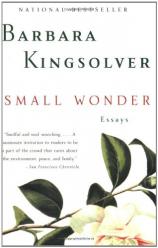Excerpt
Excerpt
Small Wonder: Essays

Letter to My Mother
Imagine you putting on your glasses to read this letter. Oh, Lord, what now? You tilt your head back and hold the page away from you, your left hand flat on your chest, protecting your heart. "Dear Mom" at the top of a long, typed letter from me has so often meant trouble. Happy, uncomplicated things -- these I could always toss you easily over the phone: I love you, where in the world is my birth certificate, what's in your zucchini casserole, happy birthday, this is our new phone number, we're having a baby in March, my plane comes in at seven, see you then, I love you.
The hard things went into letters. I started sending them from college, the kind of self-absorbed epistles that usually began as diary entries and should have stayed there. During those years I wore black boots from an army surplus store and a five-dollar haircut from a barbershop and went to some trouble to fill you in on the great freedom women could experience if only they would throw off the bondage of housewifely servitude. I made sideways remarks about how I couldn't imagine being anybody's wife. In my heart I believed that these letters -- in which I tried to tell you how I'd become someone entirely different from the child you'd known -- would somehow make us friends. But instead they only bought me a few quick gulps of air while I paced out the distance between us.
I lived past college, and so did my hair, and slowly I learned the womanly art of turning down the volume. But I still missed you, and from my torment those awful letters bloomed now and then. I kept trying; I'm trying still. But this time I want to say before anything else: Don't worry. Let your breath out. I won't hurt you anymore. We measure the distance in miles now, and I don't have to show you I'm far from where I started. Increasingly, that distance seems irrelevant. I want to tell you what I remember.
I'm three years old. You've left me for the first time with your mother while you and Daddy took a trip. Grandmama fed me cherries and showed me the secret of her hair: Five metal hairpins come out, and the everyday white coil drops in a silvery waterfall to the back of her knees. Her house smells like polished wooden stairs and soap and Granddad's onions and ice cream, and I would love to stay there always but I miss you bitterly without end. On the day of your return I'm standing in the driveway waiting when the station wagon pulls up. You jump out your side, my mother in happy red lipstick and red earrings, pushing back your dark hair from the shoulder of your white sleeveless blouse, turning so your red skirt swirls like a rose with the perfect promise of you emerging from the center. So beautiful. You raise one hand in a tranquil wave and move so slowly up the driveway that your body seems to be underwater. I understand with a shock that you are extremely happy. I have been miserable and alone waiting in the driveway, and you were at the beach with Daddy and happy. Happy without me.
I am sitting on your lap, and you are crying. Thank you, honey, thank you, you keep saying, rocking back and forth as you hold me in the kitchen chair. I've brought you flowers: the sweet peas you must have spent all spring trying to grow, training them up the trellis in the yard. You had nothing to work with but abundant gray rains and the patience of a young wife at home with pots and pans and small children, trying to create just one beautiful thing, something to take you outside our tiny white clapboard house on East Main. I never noticed until all at once they burst through the trellis in a pink red purple dazzle. A finger-painting of colors humming against the blue air: I could think of nothing but to bring it to you. I climbed up the wooden trellis and picked the flowers. Every one. They are gone already, wilting in my hand as you hold me close in the potato-smelling kitchen, and your tears are damp in my hair but you never say a single thing but Thank you.
Your mother is dead. She was alive, so thin that Granddad bought her a tiny dark-blue dress and called her his fashion model and then they all went to the hospital and came home without her. Where is the dark-blue dress now? I find myself wondering, until it comes to me that they probably buried her in it. It's under the ground with her. There are so many things I don't want to think about that I can't bear going to bed at night.
It's too hot to sleep. My long hair wraps around me, grasping like tentacles. My brother and sister and I have made up our beds on cots on the porch, where it's supposed to be cooler. They are breathing in careless sleep on either side of me, and I am under the dark cemetery ground with Grandmama. I am in the stars, desolate, searching out the end of the universe and time. I am trying to imagine how long forever is, because that is how long I will be dead for someday. I won't be able to stand so much time being nothing, thinking of nothing. I've spent many nights like this, fearing sleep. Hating being awake.
I get up, barefoot and almost nothing in my nightgown, and creep to your room. The door is open, and I see that you're awake, too, sitting up on the edge of your...
Excerpted from Small Wonder © Copyright 2012 by Barbara Kingsolver. Reprinted with permission by Perennial. All rights reserved.
Small Wonder: Essays
- paperback: 267 pages
- Publisher: Harper Perennial
- ISBN-10: 0060504080
- ISBN-13: 9780060504083








